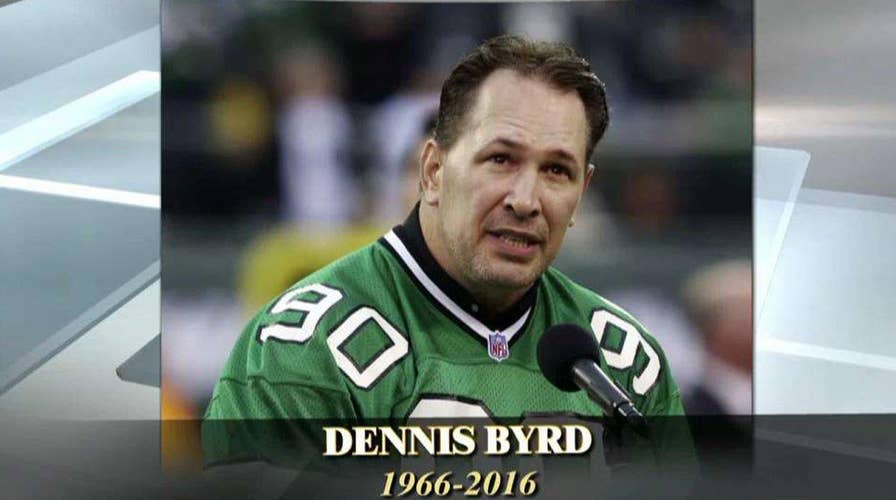Former NFL player Dennis Byrd killed in car crash
Athlete became a motivational speaker after a paralyzing injury
Dennis Byrd was an inspiration for far more than anything he ever accomplished on a football field.
He was able to walk again.
And with each step he took toward recovery from paralysis while guided by his always-present faith, Byrd defied doctors' grim predictions and became a symbol of perseverance and hope.
On Saturday, the former NFL defensive lineman whose career was ended by a neck injury, was killed in a car accident. He was 50.
The Oklahoma Highway Patrol said Byrd died in a two-vehicle collision on Oklahoma 88 north of Claremore.
The Tulsa World first reported Byrd's death. He starred at Mustang High School outside Oklahoma City and then at the University of Tulsa before playing for the New York Jets.
"We extend our sincere condolences to Dennis' wife, Angela, their children and the entire Byrd family," said Dr. Derrick Gragg, Tulsa's athletic director. "Dennis exemplified true determination, tremendous heart and humility throughout his life. He had a tremendous playing career at TU and professionally with the New York Jets. He overcame great personal adversity after a life-altering injury on the football field.
"We know that Dennis touched numerous lives and will be missed by many."
The Oologah-Talala Emergency Medical Services said the crash happened about 11 a.m. between Oologah and Claremore. It said a 17-year-old Claremore youth driving a 2000 Ford Explorer northbound on Oklahoma 88 veered into the oncoming lane, striking the 2004 Hummer H2 that Byrd was driving.
Byrd, who had returned to his home in Talala in recent years, was pronounced dead at the scene, and the 17-year-old driver and a 12-year-old passenger in Byrd's vehicle were taken in critical condition to Saint Francis Hospital in Tulsa.
The 6-foot-5, 270-pound Byrd was a second-round draft pick of the Jets in 1989 and quickly became a fan favorite for his intensity on the field as much as his humble, soft-spoken approach off it.
He was considered one of the NFL's promising young defensive ends during his first three seasons, racking up 27 sacks — a mark that only two players in franchise history surpassed: Mark Gastineau with 33 1/2 from 1979-81 and John Abraham with 27 1/2 from 2000-02.
Byrd had one sack midway through his fourth season when his life was changed during a game on Nov. 29, 1992, against Kansas City.
He broke his neck after slamming headfirst into the chest of teammate Scott Mersereau as Chiefs quarterback David Krieg stepped forward to avoid a sack. The impact broke the C-5 vertebra in Byrd's neck, leaving him briefly paralyzed, although doctors were uncertain if Byrd would ever be able to walk again.
After a vigorous rehabilitation over the next several months, Byrd returned to the Meadowlands for the Jets' opening game the following season and walked — gingerly but unaided — to midfield as an honorary captain.
He never fully recovered from the injury, walking with some difficulty and going through continuous rehabilitation during the years since. But Byrd, a devout Christian, wrote a book in 1993 called "Rise and Walk: The Trial and Triumph of Dennis Byrd," which detailed how he relied on his faith and family to push through his injury to recover and serve an inspiration to others who went through similar situations.
Byrd's story was later made into a made-for-TV movie, with actor-director Peter Berg playing him.
During the 2010 season, Byrd sent then-Jets coach Rex Ryan the No. 90 jersey that had been torn from his torso on the field after the collision as an inspirational gift.
As a guest of the team, Byrd delivered a moving speech to the Jets at their hotel the night before a 28-21 playoff victory over the New England Patriots — during which the Jets had hung Byrd's jersey in their locker room.
Running back LaDainian Tomlinson and safety James Ihedigbo also carried out a green and white No. 90 jersey to midfield for the coin toss before the game. Many Jets players credited Byrd's speech for helping motivate them to the victory.
"Hearing about his story for the first time really makes you understand how fortunate we are and how fragile your career is," then-quarterback Mark Sanchez said at the time. "These moments you have on the plane, hanging around in the locker room, having fun with guys, going to eat, playing on the field, it's pretty special. It can end at any moment. That was just a good reminder for us of how fortunate we are."
No Jets player has worn No. 90 since Byrd, and on Oct. 28, 2012, the team honored him at halftime of its game against Miami by making him the fifth player in franchise history to have his number retired.
Mersereau introduced Byrd to the crowd, saying the most touching moment of his life came when he visited Byrd in the hospital and his teammate — unable to walk at that time — told him: "Angie and I have been worried about you."
Flanked by wife Angela and their four children, along with several of his former teammates, Byrd fought back tears while he was given a standing ovation by the fans at MetLife Stadium.
"I learned to be a man in Oklahoma," Byrd said, "and I grew to be a man in New York."
Every year, a Jets player is selected by his teammates to receive the Dennis Byrd Most Inspirational Player award.
"I really have loved coaching football and working with kids, talking about the lessons I've learned as an athlete and the journey as someone with a disability," Byrd said in 2012. "Football has always been, for me, a cornerpost of strength and a way to accomplish things in life, whether it's on the field or just in maintaining a quality of life. All those lessons — dedication, perseverance, teamwork — they all dovetail nicely into living a blessed life."









































